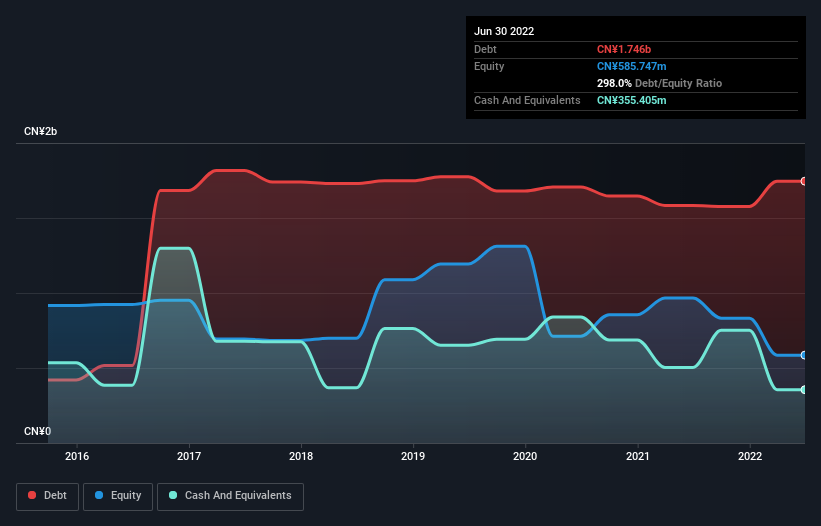
Warren Buffett famously said, 'Volatility is far from synonymous with risk.' When we think about how risky a company is, we always like to look at its use of debt, since debt overload can lead to ruin. We note that Yestar Healthcare Holdings Company Limited (HKG:2393) does have debt on its balance sheet. But should shareholders be worried about its use of debt?
What Risk Does Debt Bring?
Debt assists a business until the business has trouble paying it off, either with new capital or with free cash flow. If things get really bad, the lenders can take control of the business. However, a more common (but still painful) scenario is that it has to raise new equity capital at a low price, thus permanently diluting shareholders. Of course, the upside of debt is that it often represents cheap capital, especially when it replaces dilution in a company with the ability to reinvest at high rates of return. The first thing to do when considering how much debt a business uses is to look at its cash and debt together.
See our latest analysis for Yestar Healthcare Holdings
What Is Yestar Healthcare Holdings's Debt?
As you can see below, at the end of June 2022, Yestar Healthcare Holdings had CN¥1.75b of debt, up from CN¥1.58b a year ago. Click the image for more detail. On the flip side, it has CN¥355.4m in cash leading to net debt of about CN¥1.39b.

How Healthy Is Yestar Healthcare Holdings' Balance Sheet?
The latest balance sheet data shows that Yestar Healthcare Holdings had liabilities of CN¥2.00b due within a year, and liabilities of CN¥1.61b falling due after that. On the other hand, it had cash of CN¥355.4m and CN¥1.46b worth of receivables due within a year. So it has liabilities totalling CN¥1.79b more than its cash and near-term receivables, combined.
Given this deficit is actually higher than the company's market capitalization of CN¥1.23b, we think shareholders really should watch Yestar Healthcare Holdings's debt levels, like a parent watching their child ride a bike for the first time. In the scenario where the company had to clean up its balance sheet quickly, it seems likely shareholders would suffer extensive dilution.
We measure a company's debt load relative to its earnings power by looking at its net debt divided by its earnings before interest, tax, depreciation, and amortization (EBITDA) and by calculating how easily its earnings before interest and tax (EBIT) cover its interest expense (interest cover). Thus we consider debt relative to earnings both with and without depreciation and amortization expenses.
Weak interest cover of 0.23 times and a disturbingly high net debt to EBITDA ratio of 8.1 hit our confidence in Yestar Healthcare Holdings like a one-two punch to the gut. The debt burden here is substantial. Even worse, Yestar Healthcare Holdings saw its EBIT tank 88% over the last 12 months. If earnings continue to follow that trajectory, paying off that debt load will be harder than convincing us to run a marathon in the rain. When analysing debt levels, the balance sheet is the obvious place to start. But it is future earnings, more than anything, that will determine Yestar Healthcare Holdings's ability to maintain a healthy balance sheet going forward. So if you want to see what the professionals think, you might find this free report on analyst profit forecasts to be interesting.
Finally, a company can only pay off debt with cold hard cash, not accounting profits. So the logical step is to look at the proportion of that EBIT that is matched by actual free cash flow. Over the last three years, Yestar Healthcare Holdings actually produced more free cash flow than EBIT. There's nothing better than incoming cash when it comes to staying in your lenders' good graces.
Our View
On the face of it, Yestar Healthcare Holdings's interest cover left us tentative about the stock, and its EBIT growth rate was no more enticing than the one empty restaurant on the busiest night of the year. But on the bright side, its conversion of EBIT to free cash flow is a good sign, and makes us more optimistic. We should also note that Medical Equipment industry companies like Yestar Healthcare Holdings commonly do use debt without problems. Overall, it seems to us that Yestar Healthcare Holdings's balance sheet is really quite a risk to the business. So we're almost as wary of this stock as a hungry kitten is about falling into its owner's fish pond: once bitten, twice shy, as they say. When analysing debt levels, the balance sheet is the obvious place to start. However, not all investment risk resides within the balance sheet - far from it. For example, we've discovered 3 warning signs for Yestar Healthcare Holdings (2 make us uncomfortable!) that you should be aware of before investing here.
At the end of the day, it's often better to focus on companies that are free from net debt. You can access our special list of such companies (all with a track record of profit growth). It's free.
New: Manage All Your Stock Portfolios in One Place
We've created the ultimate portfolio companion for stock investors, and it's free.
• Connect an unlimited number of Portfolios and see your total in one currency
• Be alerted to new Warning Signs or Risks via email or mobile
• Track the Fair Value of your stocks
Have feedback on this article? Concerned about the content? Get in touch with us directly. Alternatively, email editorial-team (at) simplywallst.com.
This article by Simply Wall St is general in nature. We provide commentary based on historical data and analyst forecasts only using an unbiased methodology and our articles are not intended to be financial advice. It does not constitute a recommendation to buy or sell any stock, and does not take account of your objectives, or your financial situation. We aim to bring you long-term focused analysis driven by fundamental data. Note that our analysis may not factor in the latest price-sensitive company announcements or qualitative material. Simply Wall St has no position in any stocks mentioned.
About SEHK:2393
Yestar Healthcare Holdings
An investment holding company, manufactures and sells medical imaging products in Mainland China.
Adequate balance sheet with acceptable track record.
Market Insights
Community Narratives



